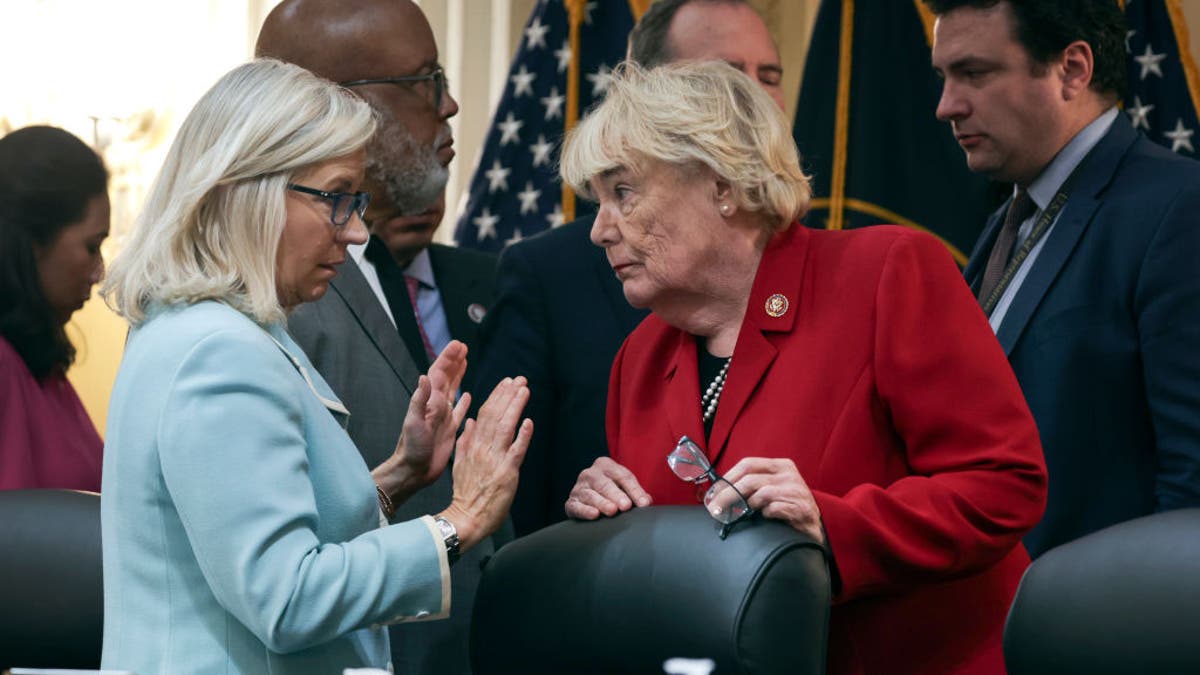Liz Cheney loses primary after continuing to face off with Trump
Fox News correspondent Rich Edson has the latest on Liz Cheney's loss in the primary election on 'Special Report.'
Reps. Liz Cheney, R-Wyo., and Zoe Lofgren, D-Calif., introduced legislation on Monday clarifying that the vice president has no authority to interfere with the counting of electoral votes in presidential elections.
The Presidential Election Reform Act is the culmination of the two lawmakers’ work on the Select Committee to Investigate the January 6th Attack on the United States Capitol. Cheney is one of just two Republicans on the committee, which has spent the last year investigating what they describe as an attempted coup to overturn the results of the 2020 election.
Cheney and Rep. Adam Kinzinger, R-Ill., have supported Democratic conclusions that the demonstrators who appeared at the Capitol on January 6 were directed by former President Donald Trump, and that Trump pressured his vice president, Mike Pence, to refuse to count the electoral votes from certain states in his role as presiding officer during the joint session of Congress where votes are counted.

(L-R) U.S. Rep. Liz Cheney, Vice Chairwoman of the Select Committee to Investigate the January 6th Attack on the U.S. Capitol, and Rep. Zoe Lofgren (D-CA) talk during a hearing on the January 6th investigation in the Cannon House Office Building on June 13, 2022 in Washington, D.C. (Photo by Alex Wong/Getty Images)
TRUMP ASSERTS ‘ABSOLUTION IMMUNITY’ IN CIVIL SUITS AROUND JAN. 6 ACTIONS
Over the weekend, Cheney and Lofgren wrote an op-ed that said Trump continues to make "intentionally false election-fraud allegations," which raises the prospect of "another effort to steal a presidential election."
Their bill, which is likely to get a vote in the House this week, is an attempt to close down the opportunity for any party or presidential candidate to create uncertainty about the results of the election. One way it does that is by clarifying that the vice president is only there to preside over the counting of votes.
"The role of the presiding officer is ministerial," the bill says. It adds that the vice president "shall not have any power to determine or otherwise resolve disputes concerning the proper list of electors for a State, the validity of electors for a State, or the votes of electors of a State."
"[T]he presiding officer shall not order any delay in counting or president over any period of delay in counting electoral votes," the bill adds.

Vice President Mike Pence asks a question during the fifth National Space Council meeting held at the U.S. Space and Rocket Center Tuesday, March 26, 2019, in Huntsville, Ala. Pence is calling for landing astronauts on the moon within five years. (AP Photo/Eric Schultz)
The proposal makes it much more difficult for members of Congress to object to the electoral vote count of any state. Today, only one member of the House and Senate is needed to object, which can prompt lengthy debates and votes over that objection.
But the Cheney-Lofgren bill would require a third of all members of both the House and Senate to raise an objection, creating a very high hurdle for interruptions of the count.
The bill also creates new requirements for governors of each state to transmit their presidential election results to Washington. It would require governors to certify results no later than Dec. 14, and those results must be sent to the archivist of the United States.
TRUMP BLASTS LIZ CHENEY AFTER PRIMARY LOSS TO HARRIET HAGEMAN: ‘SHE CAN FINALLY DISAPPEAR’
Governors who fail to accomplish this can face lawsuits from presidential candidates. But as Cheney and Lofgren noted in their op-ed, these challenges would take place before Congress meets on Jan. 6 to count the votes. They said this should help ensure that "Congress’s proceeding on Jan. 6 is purely ministerial."

Speaker of the House Nancy Pelosi, D-Calif., talks to reporters at the Capitol in Washington, Wednesday, July 28, 2021, the day after the first hearing by her select committee on the Jan. 6 attack. (AP Photo/J. Scott Applewhite)
The bill also writes into federal law that states can delay their presidential elections for up to five days if a catastrophic event happens that dramatically complicates the voting process. Along these lines, it gives presidential candidates the ability to petition the court for a delay in these cases.
CLICK HERE FOR THE FOX NEWS APP
The bill is likely to pass the House this week thanks to support from Democrats who continue to warn against Trump’s influence in the Republican Party. Many Republicans, meanwhile, are likely to oppose it as the product of a committee on which they weren’t allowed to participate with the members of their choice. House Speaker Nancy Pelosi rejected two GOP picks to serve on the Jan. 6 Committee, and in response, GOP leadership boycotted it.
Evidence of GOP anger over the committee could also be seen in Cheney's primary defeat in Wyoming in August.














































